Water Ethics: Are why we
must educate ourselves to respect water.
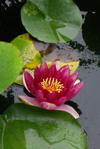 "We all live downstream on round river." As Aldo Leopold reminded
us, by that statement, we all partake in a generously renewing cycle of life.
Luna Leopold, his son, said that by the 1960s the time had come for the nation
to develop an ethical change in attitudes, behavior and understanding of water.
"We all live downstream on round river." As Aldo Leopold reminded
us, by that statement, we all partake in a generously renewing cycle of life.
Luna Leopold, his son, said that by the 1960s the time had come for the nation
to develop an ethical change in attitudes, behavior and understanding of water.
"The public has begun to perceive that clean air, clean water, decrease in acid rain, maintenance of the ozone shield, and control of carbon dioxide are commonalities that sooner or later are going to be of importance to all the people of the earth. Note also that it is the public that is forcing the Congress in this direction."1
We
stand still, at this fork in the stream where we are of two views, one mind-set
focused on using up al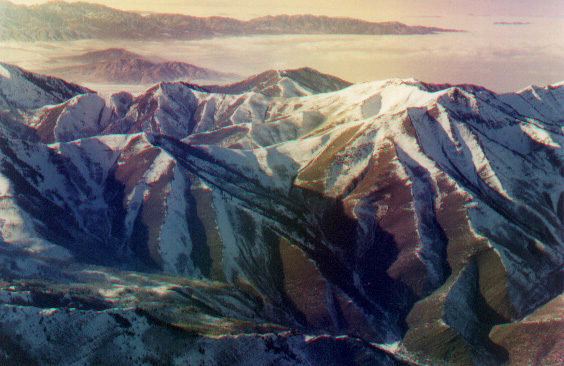 l of our renewable resources, like water; the other mind-set
saying to respect the limits of nature. This is an excursion into the ecological
connections among water, landscape, wildlife and people which suggests we must
pursue Luna Leopold's quest for a moral vision with respect to water the mover
of worlds.
l of our renewable resources, like water; the other mind-set
saying to respect the limits of nature. This is an excursion into the ecological
connections among water, landscape, wildlife and people which suggests we must
pursue Luna Leopold's quest for a moral vision with respect to water the mover
of worlds.
Humans have become an unnecessary planetary threat to our own survival because
the atmospheric, water, and marine pollution created by industrial consumer
nations is dragging us into debt. This increasing national and international
debt has robbed us of the opportunity to pay for environmental restoration or
invest in the wilderness required by urban areas to sustain their municipal
needs for water, energy, recreation, and resources.
Luna Leopold, like his father Aldo, was aware of the consumption
pressures on renewable resources and that failure of markets to allocate essential
materials could threaten water and all that is dependent in our world for the
constantly renewing fresh water cycle. The market failures that have contributed to
the destruction of natural areas that are vital to the earth's ecological life
support system must be restored and retained undiminished. This is because industrial activity
and conspicuous consumption drastically increase the rate at which natural resources
are exploited, reducing their capacity to resiliently absorb impacts, pollution, and recover from damages.
The active promotion of genetic diversity through conscious
planning, collecting, and stewarding of rare plants and animals as well as the
protection of sufficiently vast habitats for their proliferation is an international
imperative.
Ozone, acidity & carbon dioxide concentrations in the atmosphere must not
be drastically 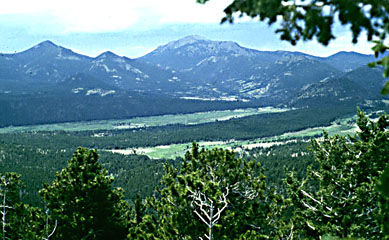 altered
if we are to survive as a civilized species. Our cities will slide beyond their
current intolerable conditions should we further destroy our open spaces. Whether
these areas are farms, wetlands, forests, sand hills, or river banks sufficient
open space is critical for the survival of cities and their civilizations. Everything
needs to breathe -- and cities are no exception -- their residents require the
myriad natural services provided by these open spaces.
altered
if we are to survive as a civilized species. Our cities will slide beyond their
current intolerable conditions should we further destroy our open spaces. Whether
these areas are farms, wetlands, forests, sand hills, or river banks sufficient
open space is critical for the survival of cities and their civilizations. Everything
needs to breathe -- and cities are no exception -- their residents require the
myriad natural services provided by these open spaces.
National Forests supply Denver, Salt Lake City, Los Angeles,
and San Diego with water. The southern ranges of the great Smoky Mountains
sustains oyster beds in northern Florida. The snow melt and runoff from the
Sierra Nevada once sustained salmon fishery runs from the Pacific Ocean up into
the streams where spawning grounds for adult salmon where scattered beneath
the well forested watershed.
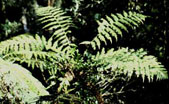 We are hardly aware that trees and vegetation redistribute water
from the ground into the air. This process of evaporation and transpiration
accompanies the production of oxygen. Without oxygen we could not survive. The
precise amount of oxygen in our atmosphere allows combustion to occur, without
a global conflagrations, where all vegetation might burn, spontaneously from
the explosive power of too rich a mixture of oxygen. Oxygen is created by plants
and bacteria in the presence of sunlight, by removing the one oxygen atom from
the water molecule. All living things are largely made of water.
We are hardly aware that trees and vegetation redistribute water
from the ground into the air. This process of evaporation and transpiration
accompanies the production of oxygen. Without oxygen we could not survive. The
precise amount of oxygen in our atmosphere allows combustion to occur, without
a global conflagrations, where all vegetation might burn, spontaneously from
the explosive power of too rich a mixture of oxygen. Oxygen is created by plants
and bacteria in the presence of sunlight, by removing the one oxygen atom from
the water molecule. All living things are largely made of water.
Unless we commit to identify, protect, nurture and restore the
ecological communities 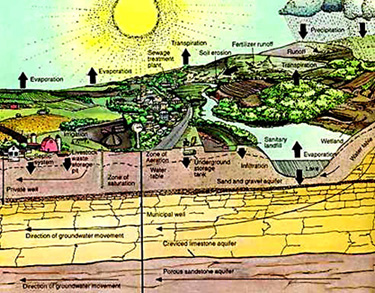 that
sustain our cities, industries and define our regional character we will have
no benchmark against which to measure our achievements. Water is a one benchmark
we use to measure human impacts, air quality is another. But wild creatures
are an even more revealing marker of our affects on the surrounding milieu,
because nature is an assembly of functioning parts and wildlife tell us how
those parts work. A new group of environmental ethics advocates suggest that
nature imparts meaning to our human condition.
that
sustain our cities, industries and define our regional character we will have
no benchmark against which to measure our achievements. Water is a one benchmark
we use to measure human impacts, air quality is another. But wild creatures
are an even more revealing marker of our affects on the surrounding milieu,
because nature is an assembly of functioning parts and wildlife tell us how
those parts work. A new group of environmental ethics advocates suggest that
nature imparts meaning to our human condition.
The choice is ours, continue to harvest timber and fail to personally plant
a tree. At the heart of that attitude lies another behavioral obstacle to restoring
the planet's assimilative capacity. The time is running out , our global experiment
in altering the constituent elements of the atmosphere is about to extinguish
the very values we sought to nourish in our headlong pursuit of conspicuous
consumption and material wealth. What happens in these open spaces directly
affects the health of urban residents who consume vast quantities of water on
a daily basis.
We can either make use of what is at hand to diminish our impact and restore
the vegetation of our 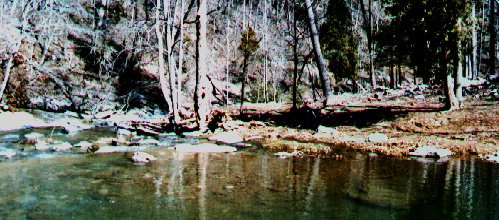 world or we can curse the darkness. If we fail to identify
what it is we really need to mutually sustain ourselves and our earth our civilization
is not worthy to survive. Archie Carr had a vision
for Florida that we embrace today and pledge to promote a water, fishery and
wildlife restoration ethic. He, like George Perkins Marsh, 150 years ago, believed
we needed to restore our scenic beauty and wildlife by protecting our waters.
They knew, as did Frederick Law Olmsted, Spencer Fullerton Baird, and Ellen
Swallow Richards that clean water is the key to our own health, the scenic beauty
we so admire and the diversity of wild populations thriving in a variety of
our forests, natural areas, wetlands, prairies and wild ocean shores.
world or we can curse the darkness. If we fail to identify
what it is we really need to mutually sustain ourselves and our earth our civilization
is not worthy to survive. Archie Carr had a vision
for Florida that we embrace today and pledge to promote a water, fishery and
wildlife restoration ethic. He, like George Perkins Marsh, 150 years ago, believed
we needed to restore our scenic beauty and wildlife by protecting our waters.
They knew, as did Frederick Law Olmsted, Spencer Fullerton Baird, and Ellen
Swallow Richards that clean water is the key to our own health, the scenic beauty
we so admire and the diversity of wild populations thriving in a variety of
our forests, natural areas, wetlands, prairies and wild ocean shores.
We dare not neglect water quality. But, we are building roads
over our water recharge areas, dumping sewage and septic ooze right into our
rivers, lakes and lagoons and over fertilizing our landscapes so that lakes
and streams choke on the runoff.
To protect ourselves we must keep our air and water
contaminant free. As our drinking water supplies shrink we must conserve
water, enforce high quality standards for water use and reward those who
reduce their waste of this vital source of health and human security.
- Water is a necessary compound that must be fit for human
consumption; so drinking water must be pathogen and contaminant free.
- Water quality and quantity must be sufficient to nourish
fisheries and sustain healthy wildlife populations.
- Water must remain a public good and a common property
resource, because it is needed by all citizens.
- Water is wedded to the scenic beauty and landscapes that
are a magnet for visitors.
- Watershed in the form of forests, wetlands and recharge
areas must be protected from contamination.
- Water symbolizes the redemptive promise of baptism and
many sacramental rituals across numerous faiths.
- Water must be re-used and restored for the proper quality, quantity, timing, and distribution throughout the watershed, water continuum2 and consumer communities.
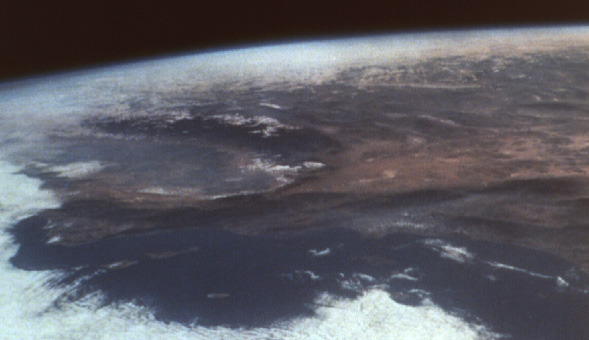
At this fork in the journey to redefine the human condition as
intimately dependent upon the earth's life support structures (air, water, fuel,
and wilderness) we have to decide what it is we are capable of effectively accomplishing
in restoring the biological diversity of those gene pools we are exploiting
if not extinguishing. For us to develop, promote and practice
a water ethic is of primary importance for this new, twenty-first century.
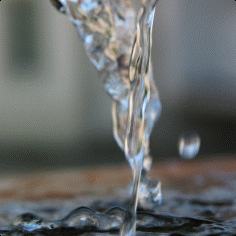
Sources:
1. "ETHOS, EQUITY AND THE WATER RESOURCE." Luna B. Leopold, University of California, Berkeley. Environment. volume 32, number 2, p. 16-41, 1990. Page 5.
2. water continuum, Luna Leopold argues that:
"By hydrologic continuum I mean the effective operation of forces in the drainage basin that maintain a balance among processes of rock weathering, soil formation, water and sediment delivery to stream channels, and the exit of water and sediment from the basin. These forces are both biologic and physical. Vegetation promotes weathering, soil formation, and infiltration, but mediates and modifies erosion and surface runoff.
Each part of the system modifies other parts. The flood plain reduces flood peaks. River curves maintain hydraulic resistance and thus help moderate velocity. Thus both form and presence interact to assure no part of the system accelerates beyond the limits of flexibility. This is what is meant by quasi-equilibrium."
Page 3.

 "We all live downstream on round river." As Aldo Leopold reminded
us, by that statement, we all partake in a generously renewing cycle of life.
Luna Leopold, his son, said that by the 1960s the time had come for the nation
to develop an ethical change in attitudes, behavior and understanding of water.
"We all live downstream on round river." As Aldo Leopold reminded
us, by that statement, we all partake in a generously renewing cycle of life.
Luna Leopold, his son, said that by the 1960s the time had come for the nation
to develop an ethical change in attitudes, behavior and understanding of water. 






